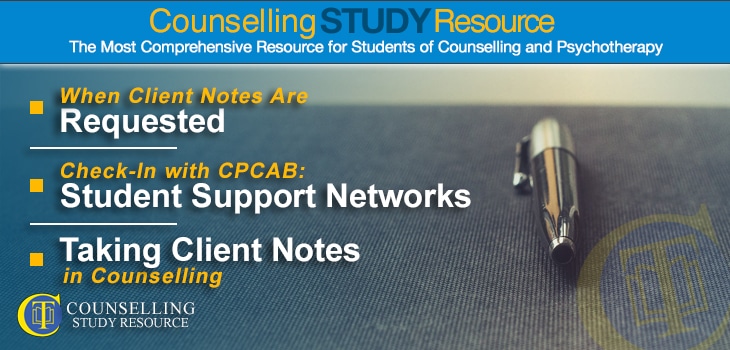136 - Best Practice in Taking Client Notes in Counselling
When Client Notes Are Requested - Student Support Networks
In episode 136 of the Counselling Tutor Podcast, Ken Kelly and Rory Lees-Oakes discuss the situations in which you may be required to release client notes. Moving onto 'Check-In with CPCAB', Rory talks to Kelly Budd about support networks for students. For the final section of the podcast, the 'Practice Matters' slot returns by popular demand; this week, it focuses on best practice in taking client notes in counselling.
* BACPAC practice management software for counsellors and psychotherapists is a sponsor of the Counselling Tutor Podcast.
Get a 30-day free trial of BACPAC and a 30% discount by using the discount code CT2020
When Client Notes Are Requested (starts at 2.05 mins)
Do you know how to respond if you receive a phone call from the police requesting that you release a set of client notes?
Rory describes the three situations in which you have to release notes:
- when a client consents to this
- in response to a court order
- when required by a coroner
It's important to be cautious if you receive such a phone call, checking out carefully that the person calling is who they say they are and really does have the authority to request the release of notes.
Make sure you take a note of the caller's name, position and organisation - together with a landline number; if the caller claims only to have a mobile number, this is a sign that the call may not be authentic.
Ken and Rory explain the steps you need to take when client notes are requested, and who to involve in this process - in particular, your insurance company, your supervisor and your agency (if applicable).
They also talk about the importance of ensuring that the possible release of notes is covered in the initial contract you make with clients, so that they are already prepared for this eventuality - and about the General Data Protection Regulation (GDPR) and who owns client notes.
Do you have experience of this situation, or questions about how you would respond?
If so, why not start a discussion (giving no client details, of course: client confidentiality is vital) on the Counselling Tutor Facebook page? There, you'll find tens of thousands of counselling and psychotherapy students ready to support each other.
Check-In with CPCAB: Student Support Networks (starts at 14.38 mins)
Rory talks to Kelly Budd (Head of Qualifications) about the importance and value of online or face-to-face meetups as ways to keep in touch with your peers when studying counselling or psychotherapy.
This matters especially at level 4 and above, when the experience of training can be intense and life-changing.
Student support networks can:
- enable you to bond with peers
- help you unpack the emotions you are feeling
- learn to relate effectively with others
- gain strength through shared experience
Rory and Kelly discuss the extent of contact with peers outside the training environment, and possible forms it might take.
On the topic of how best to respond to peers, they remind us that - above all - treating others with kindness is key.
Recent research at the Bedari Kindness Institute, University of California, Los Angeles (UCLA) revealed that kindness not only helps those receiving this but also those dispensing it, and can even help you live longer.
For more information about CPCAB, please see its website. CPCAB is the UK's only awarding body run by counsellors for counsellors.
Best Practice in Taking Client Notes in Counselling (starts at 25.30 mins)
In the return of the popular 'Practice Matters' section, Ken and Rory talk about best practice in taking client notes in counselling. They distinguish between client notes and process notes, the latter relating to the counsellor's own response to the client and their material.
Rory suggests that for taking client notes in counselling, the SAPO model is useful to bear in mind:
- Subjective: ensure that you report the client's (not your own) subjective view of the situation, e.g. 'The client stated …'
- Assessment: through the ensuing discussion, assess what is going on for the client. This will vary by modality, e.g. in cognitive behavioural therapy (CBT), you may use psychological formulation.
- Plan: what is your agreed action plan as a result (i.e. how will you work with the client's presentation?). For example (again in CBT), have you set any homework?
- Other: What you need to do in order to be prepared for the next session (e.g. when will this be, do you need to research any information for the client, or might you make a referral or offer signposting to other services?).
You can download Rory's handout on taking client notes in counselling (including examples) HERE.


